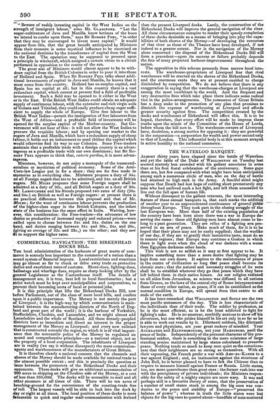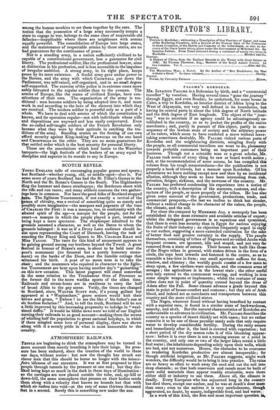THE WATERLOO BANQUET.
ALMOST thirty years have elapsed since the battle of Waterloo, and yet the table of the Duke of WELLINGTON on Tuesday last seemed scarcely less crowded with his gallant associates in arms than at his first festal celebration of the anniversary. Some gaps there are, but few compared with what might have been anticipated among such a numerous circle of men, who on the day of battle had attained to high rank in the Army. A fanciful mind might suppose that Death had lost hope of cutting short prematurely any man who had outlived such a hot fight, and left them unassailed to live out the full span of human life. Without disrespect to the gallant veterans, the most interesting feature of these annual banquets is, that each marks the addition of another year to an unprecedented continuance of general fieltai throughout Europe. They took part in the closing struggle of the last European war. More than half of the existing population of the country have been born since there was a war in Europe de- serving the name : these old fighting-men have almost come to be- long to a past generation. They are relics of a fighting wra pre- served in an xra of peace. Make much of them, for it is to be hoped that their place may not be easily supplied; that the warlike of our day, if they are to gratify their instinctive taste, must do so in remote regions ; that Europe may continue a Goshen in which there is light even when the cloud of war darkens with a worse than Egyptian darkness other lands.
This wish is not so selfish as it may at first appear to be. It implies something more than a mere desire that fighting may be kept from our own doors. It aspires to the maintenance of peace in the centre of civilization so long that peace shall become its chronic state ; that the natural and necessary struggles of its sons shall be to establish wherever they go that peace which they have left behind them in their native homes. As our religion radiated on all sides from Jerusalem, as science was diffused to all nations from Greece, as the laws of the central city of Rome interpenetrated those of every other nation, so peace, if it can be established as the normal condition in Europe, will spread from that centre to all ends of the earth.
It has been remarked that WELLINGTON and SOIILT are the two most pacific statesmen of the day. This is less characteristic of the individuals than of their trade. The soldier by profession, as he is the most efficient, so is he the least addicted to fight for fighting's sake. He is no amateur, morbidly anxious to show off his cleverness, but one who prides himself in his art only in so far as be is able to work out results by it. Dilettanti soldiers, like dilettanti lawyers and physicians, are your great makers of mischief. Your ALTCELANDS and ELLENBOROUGHS not your HARDINGES, peril the peace of India. Independently of personal character of the pro- fessional soldier, there is something in the mere existence of large standing armies maintained by large states calculated to preserve peace. Nothing tends so much to keep men quiet as the conscious- ness that their neighbours are as strong as themselves. With all their vapouring, the French prefer a war with ABD-EL-KADER to a war against England; and, no insinuation against the stoutness of John Bull, he is better pleased to have to lick the Chinese than to require to measure himself against France or Russia. Little states, too, are more quarrelsome than great ones : the former rush into war with the precipitancy of private individuals; the Ministers respon- sible for the safety of a mighty empire are more wary. It was and perhaps still is a favourite theory of some, that the preservation of a number of small states stuck in among the big ones was con- ducive to the peace and stability of Europe—" preserved the balance of power " ; whereas in truth the little states were but objects for the big ones to quarrel about---handfuls of nuts scattered
among the human monkies to set them together by the ears. The notion that the possession of a large army necessarily tempts a state to engage in war, belongs to the same class of respectable old fallacies—inapplicable where there are neighbours with armies equally powerful. The consolidation of Europe into large states, and the maintenance of respectable armies by these states, are no bad guarantees for the continuance of peace.
• Nor is a standing army, in a nation sufficiently civilized to be capable of a constitutional government, less a guarantee for civil liberty. The professional soldier, like the professional lawyer, aims at distinction in his profession, and is less accessible to the impulses of irregular ambition. A strong army, in its right place, keeps peace by its mere existence. A feudal army gave undue power to the Barons, and the army with which CROMWELL put down the Parliament, was self-raised, self-organized, and in no small degree self-supported. The exercise of the police is in extreme cases more safely intrusted to the regular soldier than to the yeoman. The armies of Europe, like the states of civilized Europe, have con- stitutions of their own. The organization of the army is tra- ditional : men become soldiers by being adopted into it, and must work in and according to the laws of the element into which they are received. The modern soldier is powerful only as a part of a -whole. We have to deal with armies of which the constitution is known, and its operation regular—not with individuals whose wills -and dispositions are wayward and less easily conjectured. Even the so-called self-taught soldiers of the French Revolution only became what they were by their aptitude in catching the tra- titions of the army. Standing armies on the footing of our own afford security against King-making WARWICKS on the one hand and CROMWELLS on the other. They are no mean guarantees for that settled order which is the best security for personal liberty.
These are the associations which lend lustre to the Waterloo banquets—the high festivals of the leaders of an army equal in discipline and superior in its morale to any in Europe.



























 Previous page
Previous page